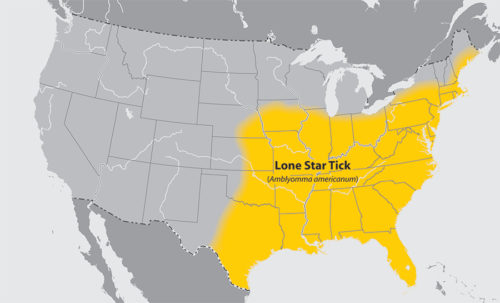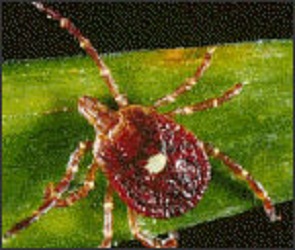Alpha-gal, a tick borne disease causing its victims to become allergic to meat is steadily spreading.
Scientists have traced the disease to the Lone Star tick, common in the U.S. Southeast.

What is alpha-gal?
- Alpha-gal (galactose-α-1,3-galactose) is a sugar molecule found in most mammals (except in people, apes, and monkeys).
- Alpha-gal is not normally found in fish, reptiles, or birds.
- Alpha-gal can be found in products made from mammals (including some medications, cosmetics, vaccines, gelatin, and milk products).
- Alpha-gal has also been found in some types of ticks.
What is alpha-gal allergy?
- An alpha-gal allergy is an allergy to the alpha-gal sugar molecule. Allergic reactions typically occur after people eat meat from mammals that have alpha-gal or are exposed to products made from mammals.
What are the symptoms of alpha-gal allergy?
- Symptoms can include:
- Rash
- Hives
- Difficulty breathing
- Drop in blood pressure
- Dizziness or faintness
- Nausea or vomiting
- Severe stomach pain
- Symptoms of an alpha-gal allergy commonly appear 3-6 hours after eating meat (e.g., beef, lamb, pork, venison, and rabbit) or exposure to products containing alpha-gal.
- Symptoms may not occur after every exposure and can vary from person to person.
Alpha-gal allergies can be severe, and even life-threatening. See a healthcare provider immediately if you are concerned about a severe allergic reaction.
How do I know if I have an alpha-gal allergy?
- Alpha-gal allergy is diagnosed by an allergist, or other healthcare provider, through a detailed patient history, physical examination, and a blood test that looks for specific antibodies (IgE antibodies) to alpha-gal.
What can I do if I have an alpha-gal allergy?
- Alpha-gal allergy should be managed under the care and supervision of a healthcare provider. Early recognition and changes in diet (e.g., avoiding meat) may prevent serious and life-threatening health problems.
Who as at risk for developing an alpha-gal allergy?
- Most cases of alpha-gal allergy have been reported in the southeastern and midwestern United States.
- Both children and adults can develop alpha-gal allergy; however, most cases of alpha-gal allergy appear to be in people >50 years of age.
Can you get an alpha-gal allergy from a tick bite?
- Scientists do not yet know. Data from the United States and other countries suggest that alpha-gal allergy may be associated with tick bites. However, more research is needed to determine if tick bites can cause alpha-gal allergy.
What can you do to prevent alpha-gal allergy?
Until additional research confirms this association with tick bites, take steps to prevent tick bites.
- Before you go outdoors
- Avoid grassy, brushy, and wooded areas, where ticks may be found.
- Treat clothing and gear with permethrin or buy pre-treated items.
- Use Environmental Protection Agency (EPA)-registered insect repellents.External
- After you come indoors
- Check your clothing for ticks.
- Shower and perform a thorough tick check.
- If you see an attached tick, remove it immediately.
- Take steps to prevent ticks on your pets and in your yard.
